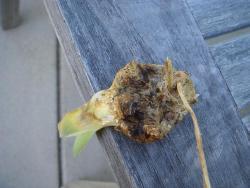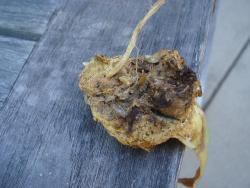crowrita1 said:.It's my understanding that the fungal spores are almost everywhere in the soil, and only become a problem when weather, or soil conditions are "right " to allow it to attack a weakened plant....Arlyn
Exactly right. You could remove the top foot of soil from your entire yard and the fungus that attacked your plant will still be present. Fungi are exquisitely adapted to dispersing their spores far and wide and the spores can can lie dormant for decades. That sounds ominous, but it's not. IMO, people have a emotional reaction to fungi all out of proportion to what they really do. Often, in our zeal to control some "fungus problem", we do more harm than good. Most plants have a beneficial relationship with a type of root fungus called Mycorrhizae. Many plants even can't survive without them. The widespread application of fungicides in recent decades has had some real negative consequences for the plant world.
Back to irises, I often think "fungus problems" are a just symptom of another problem. For example, most gardeners in this area saw a lot of rot in their irises early this spring. The general consensus was that it was Botrytis and many people started applying fungicides, sometimes a cocktail of fungicides to control it. My question was, why did we all have an outbreak of Botrytis this year after not seeing it in previous years?
We had some really severe weather this winter. This is a guess on my part (just like everyone else), but I think some of the rhizomes were killed by the winter weather THEN they rotted, rot being a natural event after something dies. While most people were spraying and digging, I didn't do much of anything about the "fungus problem" in my irises. No fungicides, no bleach, no soil removal. Was it the right approach? I don't know

. I do know this, most people talked about what a poor bloom season we had around here this year, but my irises bloomed pretty well, above average certainly. At the minimum, not worrying about the "fungus problem" saved me a lot of time and money.


